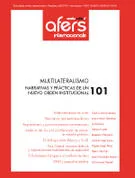Regionalism and South American orientation: UNASUR and ALBA

This study examines whether or not integration in South America is shaping a new type of regionalism. The author takes the cases of UNASUR and ALBA and shows – on the basis of the characteristics of institutionality, leaderships and identities – what the incentives for cooperation are. One of the essential elements for all integration is the defence agreements that are articulated in different ways in each of the organisations. The article attempts to show that both UNASUR and ALBA were structured using a new logic, by prioritising political agreements over commercial ones. The author describes a new South American notion that is still under construction, but which is more narrative- and discourse-oriented than involving formalised actions. As a result, we cannot conclude that this represents a new type of regionalism.
Key words: regionalism, UNASUR, ALBA, integration, defence cooperation, leadership
The full text articles of this issue are available only in Spanish language.